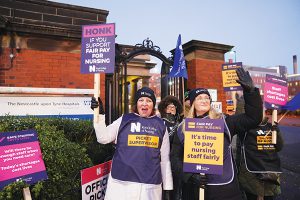Bloomberg
Nurses began a round of historic strikes across much of Britain, with protesters on picket lines saying they’re struggling to afford basic living costs such as food and accommodation.
The Royal College of Nursing (RCN) has said that as many as 100,000 staff were expected to take part in the strike across England, Wales and Northern Ireland in protest over a below-inflation pay offer. The walkouts will affect hospitals such as Guy’s, St Thomas’s and Great Ormond Street in London, and be repeated on December 20.
“When I started nursing, you wouldn’t be rich but you’d get decent pay,†Mary Smith, who moved to the UK from Ireland, told Bloomberg News from a picket line outside St Thomas’s. She added that some of her colleagues were now resorting to food banks.
“At the end of every month, there’s nurses that are taking food from the patients’ cupboard and we’re not supposed to do it — nobody wants to. But by the last week before they get paid, if they don’t have enough money, they take the beans from the cupboard and eat that.â€
Newly-qualified nurses in the National Health Service are paid £27,055 (about $33,300) with those in inner London paid £32,466. The pay grades are from the government pay package announced in July that would see the average nurse’s pay increasing by about 4%. The RCN is demanding action over patient safety concerns and a pay rise of 5% above inflation as measured by the retail price index — which currently stands at 14%.
Pat Cullen, the RCN’s general secretary, called the strikes a “tragic first,†adding: “Nursing staff on picket lines is a sign of failure on the part of governments.†It is by far the most widespread nurses’ strike in the history of Britain’s health service.
The RCN could announce extra strike dates for 2023 next week if a pay deal is not reached.
Prime Minister Rishi Sunak’s spokesman, Max Blain, told reporters on Thursday that Health Secretary Steve Barclay is open to further meetings with the RCN to discuss working conditions, while suggesting the government isn’t likely to budge on pay.
“We think it is right to abide by the recommendations of the pay review body,†Barclay said, referring to the independent panel that makes recommendations on public sector pay deals. “There are wider issues around ways to improve morale and working conditions for nurses.â€
Blain said that each 1% extra in pay for so-called agenda for change National Health Service staff would cost the government £700 million.
The category – which includes nurses — covers all NHS staff except doctors, dentists and very senior managers. The strikes affect 53 out of 264 areas, he said.
On Wednesday, Keir Starmer, leader of the opposition Labour party, said the walkouts were a “badge of shame†for the government.
“This can only be resolved by government, acknowledging the anger of our members by seeing the impact on health services,†said Mark Farmer, a regional director at the RCN.
Many nurses cannot afford to buy or even rent a home in the capital, he added. Many nurses will “train in London, they will work in London for a period of time — and then they leave because the cost of living pressures are so high.â€
Rebecca Davies, who works in nurse recruitment, said it was increasingly difficult to attract people to the job. “You’ve got to start competing with other industry, it’s not all about being a lovely kind nurse,â€
she said, “You have to be able to afford to live.â€
 The Gulf Time Newspaper One of the finest business newspapers in the UAE brought to you by our professional writers and editors.
The Gulf Time Newspaper One of the finest business newspapers in the UAE brought to you by our professional writers and editors.
